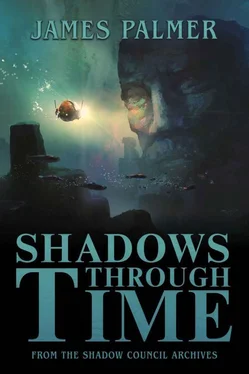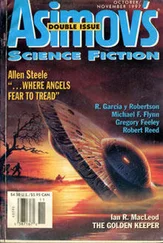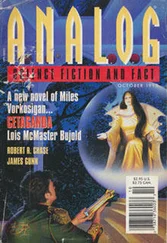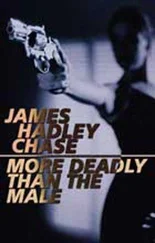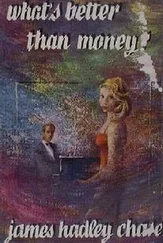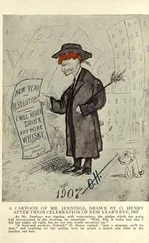“It grew to prominence while you were away. There has been some speculation about it in the papers. Speaking of which, those strange incidents you mentioned…”
“The spiritualist madness,” said Burton.
“Yes. You seem to have a very good memory of it, but I don’t have any recollection of it at all. Nor did Mycroft Holmes.”
“Yes,” said Burton with a nod, “that is one of my main concerns, and the reason I called on the, um, Time Traveler. I read several newspapers discussing it before I left. One of them was still on my writing desk when I returned home, only now it has a completely different front page headline and story.”
“What? But how is that possible?”
Burton pulled a cheroot from the pocket of his coat, struck a lucifer and lit the tip. He puffed on it thoughtfully before continuing. “There are only two possibilities. Either I am completely mad, or my journey through Time has inadvertently changed some small, minute detail that somehow led to this new turn of events, and this cult.
And Isabel’s disappearance , he thought.
Abberline nodded. “The problem with that is, how can you prove it? It’s your word against…well…the whole of London’s.”
Burton watched a passing hansom, the smelly dray pulling it clopping on the cobblestones. “Exactly. Everyone will simply think I’m mad, which, as I just pointed out, I very well could be.”
“Well,” said Abberline, “if the story you told us in there is true, they’ll need to lock me up in Bedlam right beside you. But I can tell you one thing, this cult is real enough. I don’t know exactly what they’re up to in the East End, but I don’t like it.”
“We’ll get to the bottom of it,” said Burton with a smile. “Of that you can be certain. Now, let’s go to my rooms at Gloucester Place.”
Abberline scowled. “For what?”
“To try on disguises.”
“Blimey. This day just gets stranger and stranger. Scotland Yard is going to owe me double time for this.”
It was approaching midnight when two ne’re-do-wells stepped into a decrepit pub called the Elder Sign. Both men were tall, but one man was several years older than the other, and had a very pronounced Y-shaped scar on his left cheek, no doubt a memento from some long ago scrape in which he obviously emerged the victor. He wore a long, ragged coat, threadbare and one size too large for him. The top of his head was stuffed into a dirty, misshapen bowler.
His companion was thin, with graying whiskers. He wore a brown tweed suit that had definitely seen better days, and a worn slouch hat perched at a jaunty angle on his head, casting his features in semi-shadow.
“I look ridiculous,” said this man to his companion.
“What matters,” said his compatriot, “is that you don’t look like a policeman. And you’d best not act like one either, or we’re both in for it.”
Chief Inspector Frederick George Abberline stared at his companion Captain Richard Francis Burton, seeing the man beyond the petty disguise, and took a deep breath, steeling himself. He nodded to the older man. There was a lot he could learn from the explorer, he told himself. After all, the man journeyed to Mecca—a place forbidden to the white man—and no one was the wiser. If he could blend in with the Mohammedans, he could bloody well fit in with the degenerate denizens of some dodgy East End pub. All Abberline had to do was follow his lead.
The two men looked around the dingy pub, which was packed despite the late hour.
“Do you have a plan?” asked Abberline.
“Yes,” said Burton, “don’t get found out.”
“Capital,” said Abberline, and the two men ordered pints—which arrived in chipped, dirty glasses—and waded into the thick of it.
For the first hour, the two gentlemen in disguise got nothing for their time and trouble save a repertoire of bawdy limericks. Then they noticed a man in the back corner of the place, having a spirited yet secretive discussion with a trio of men Abberline identified as well-known cutpurses.
Burton leaned into the bartender, a tall, swarthy man with a thick red beard, cleaning a glass with a dirty rag.
“Who is that man?”
The bartender looked where Burton pointed and scowled. “That’s John Gingham. He showed up in here one night about two weeks ago, talkin’ all crazy. Says he knows where anyone can get all the money they want, just by askin.”
The barkeep shook his head and went back to making the glasses appear less dirty.
Burton shot Abberline a sidelong glance, and the two men threaded their way toward the table of John Gingham.
“These strange events all seem to have started while I was away,” said Burton. “There must be some connection.”
The stepped up to the table John Gingham occupied and listened.
“That’s right, gents. No more silly prayers and all that genuflectin’ to a god that does nothin’ fer you. I know some gods that’ll give ya whatever ya want, whatever ya need. I know some gods that will actually do ya some good in yer lives. Real gods ye can see, that’ll swim up to ya outta the deeps, all nice and proper like.”
A chill fled up Abberline’s spine. He looked at Burton, who returned the policeman’s gaze. The look in Burton’s eyes told Abberline all he needed to know. The inspector had been seeking some indication that John Gingham was insane, but everything about Burton’s face said the man was telling the absolute truth.
John Gingham was an older man, probably around Burton’s age, though he could pass for far older. He had little if any facial hair and, despite all his talk of wealth and prosperity, appeared as if he had slept in his clothes for ages. A tattered and dirty slouch hat was stuffed over his misshapen head, and his skin had a pale, scaly pallor. The smell of fish was strong in his vicinity, which mingled unpleasantly with the other smells of sour alcohol and sweat coming from all the unwashed bodies crowded around them.
A few of the men stepped away, laughing, giving Burton and Abberline room to shove in and replace them. A couple other men behind Gingham followed suit.
“Don’t believe me?” said Gingham. “Fine. But you’ll see. Afore this is over, everyone will see. The whole of Londontown will get what’s comin’, what those of us in the Esoteric Order of Dagon have known all along. Prosperity not only in this life, but in the next. Why, I’ll be drinkin’ to my health over yer dried up bones.” He uttered a throaty cackle, revealing a mouthful of rotted teeth that reminded Abberline of broken tombstones. Still more people moved away, shaking their heads or cursing Gingham for a drunken fool.
“We’d like to know more,” said Abberline.
Gingham looked up at them, studying their faces intently. “You’re serious,” he said at last.
“Of course,” said Abberline.
“Good!” said Gingham, looking around furtively. Seeing that no one was still engaged in the conversation, he reached into a pocket and pulled out a small leather sack. Opening it, he reached inside and produced two oddly shaped and strangely colored ingots. Abberline recognized them immediately as being made from the same gold as the grotesque tiara in Mycroft Holmes’ possession. Abberline and Burton took the proffered ingots and quickly secreted them away.
“Wise gents,” said John Gingham. “These fools wouldn’t believe me, but they’d waylay me fer sure if they knew about those.”
“What is this?” asked Abberline.
“Consider it a payment, gents,” said Gingham. “For work not yet completed.”
“You have a job for us then?” asked Burton.
Читать дальше
